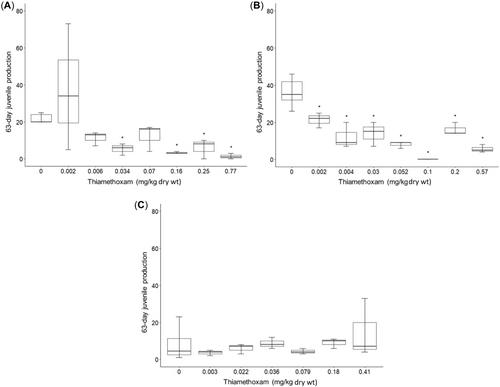下载PDF
{"title":"多代蚯蚓接触杀虫剂的影响","authors":"William J. Martin, Paul K. Sibley, Ryan S. Prosser","doi":"10.1002/etc.5948","DOIUrl":null,"url":null,"abstract":"<p>The toxicity of neonicotinoids and many of their replacement insecticides to nontarget soil invertebrates such as earthworms has previously been established. However, the long-term effects of these substances on these organisms are largely unknown. In the field of soil ecotoxicology, lumbricid earthworms such as <i>Eisenia andrei</i> are used extensively due to the availability of standardized test methods and their adaptability to laboratory culture and testing. Multigenerational studies have gained popularity and attention in recent years, with a shift toward the use of long-term assays and lower concentrations of test chemicals. The use of exposure concentrations that include those measured in a monitoring program carried out by the Government of Ontario presents a realistic exposure scenario that may not show significant effects in contemporary, shorter term studies. We used current standardized test methods as a basis for the development of multigenerational studies on <i>E. andrei</i>. The effects of exposure to a single application of the insecticides thiamethoxam and cyantraniliprole on the survival and reproduction of <i>E. andrei</i> were observed over three (thiamethoxam) or two (cyantraniliprole) generations using consecutive reproduction tests. No significant impacts on adult survival were reported in any generation for either insecticide, whereas reproduction decreased between the first and second generations in the thiamethoxam test, with median effective concentration (EC50) values of 0.022 mg/kg dry weight reported for the first generation compared with 0.002 mg/kg dry weight in the second generation. For cyantraniliprole, an EC50 of 0.064 was determined for the first generation compared with 0.016 mg/kg dry weight in the second generation. A third generation was completed for the thiamethoxam test, and a significant decrease in reproduction was observed in all treatments and controls compared with previous generations. No significant difference between thiamethoxam treatments and the control treatment was reported for the third generation. Collectively, these data indicate that exposure of oligochaetes to these two insecticides at concentrations representative of field conditions may result in long-term stresses. <i>Environ Toxicol Chem</i> 2024;43:2058–2070. © 2024 The Author(s). <i>Environmental Toxicology and Chemistry</i> published by Wiley Periodicals LLC on behalf of SETAC.</p>","PeriodicalId":11793,"journal":{"name":"Environmental Toxicology and Chemistry","volume":"43 9","pages":"2058-2070"},"PeriodicalIF":3.6000,"publicationDate":"2024-07-09","publicationTypes":"Journal Article","fieldsOfStudy":null,"isOpenAccess":false,"openAccessPdf":"https://onlinelibrary.wiley.com/doi/epdf/10.1002/etc.5948","citationCount":"0","resultStr":"{\"title\":\"Effect of Insecticide Exposure Across Multiple Generations of the Earthworm Eisenia andrei\",\"authors\":\"William J. Martin, Paul K. Sibley, Ryan S. Prosser\",\"doi\":\"10.1002/etc.5948\",\"DOIUrl\":null,\"url\":null,\"abstract\":\"<p>The toxicity of neonicotinoids and many of their replacement insecticides to nontarget soil invertebrates such as earthworms has previously been established. However, the long-term effects of these substances on these organisms are largely unknown. In the field of soil ecotoxicology, lumbricid earthworms such as <i>Eisenia andrei</i> are used extensively due to the availability of standardized test methods and their adaptability to laboratory culture and testing. Multigenerational studies have gained popularity and attention in recent years, with a shift toward the use of long-term assays and lower concentrations of test chemicals. The use of exposure concentrations that include those measured in a monitoring program carried out by the Government of Ontario presents a realistic exposure scenario that may not show significant effects in contemporary, shorter term studies. We used current standardized test methods as a basis for the development of multigenerational studies on <i>E. andrei</i>. The effects of exposure to a single application of the insecticides thiamethoxam and cyantraniliprole on the survival and reproduction of <i>E. andrei</i> were observed over three (thiamethoxam) or two (cyantraniliprole) generations using consecutive reproduction tests. No significant impacts on adult survival were reported in any generation for either insecticide, whereas reproduction decreased between the first and second generations in the thiamethoxam test, with median effective concentration (EC50) values of 0.022 mg/kg dry weight reported for the first generation compared with 0.002 mg/kg dry weight in the second generation. For cyantraniliprole, an EC50 of 0.064 was determined for the first generation compared with 0.016 mg/kg dry weight in the second generation. A third generation was completed for the thiamethoxam test, and a significant decrease in reproduction was observed in all treatments and controls compared with previous generations. No significant difference between thiamethoxam treatments and the control treatment was reported for the third generation. Collectively, these data indicate that exposure of oligochaetes to these two insecticides at concentrations representative of field conditions may result in long-term stresses. <i>Environ Toxicol Chem</i> 2024;43:2058–2070. © 2024 The Author(s). <i>Environmental Toxicology and Chemistry</i> published by Wiley Periodicals LLC on behalf of SETAC.</p>\",\"PeriodicalId\":11793,\"journal\":{\"name\":\"Environmental Toxicology and Chemistry\",\"volume\":\"43 9\",\"pages\":\"2058-2070\"},\"PeriodicalIF\":3.6000,\"publicationDate\":\"2024-07-09\",\"publicationTypes\":\"Journal Article\",\"fieldsOfStudy\":null,\"isOpenAccess\":false,\"openAccessPdf\":\"https://onlinelibrary.wiley.com/doi/epdf/10.1002/etc.5948\",\"citationCount\":\"0\",\"resultStr\":null,\"platform\":\"Semanticscholar\",\"paperid\":null,\"PeriodicalName\":\"Environmental Toxicology and Chemistry\",\"FirstCategoryId\":\"93\",\"ListUrlMain\":\"https://onlinelibrary.wiley.com/doi/10.1002/etc.5948\",\"RegionNum\":4,\"RegionCategory\":\"环境科学与生态学\",\"ArticlePicture\":[],\"TitleCN\":null,\"AbstractTextCN\":null,\"PMCID\":null,\"EPubDate\":\"\",\"PubModel\":\"\",\"JCR\":\"Q2\",\"JCRName\":\"ENVIRONMENTAL SCIENCES\",\"Score\":null,\"Total\":0}","platform":"Semanticscholar","paperid":null,"PeriodicalName":"Environmental Toxicology and Chemistry","FirstCategoryId":"93","ListUrlMain":"https://onlinelibrary.wiley.com/doi/10.1002/etc.5948","RegionNum":4,"RegionCategory":"环境科学与生态学","ArticlePicture":[],"TitleCN":null,"AbstractTextCN":null,"PMCID":null,"EPubDate":"","PubModel":"","JCR":"Q2","JCRName":"ENVIRONMENTAL SCIENCES","Score":null,"Total":0}
引用次数: 0
引用
批量引用


